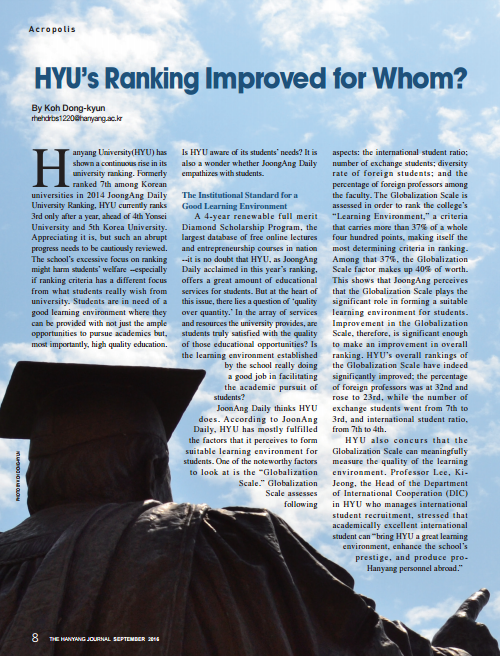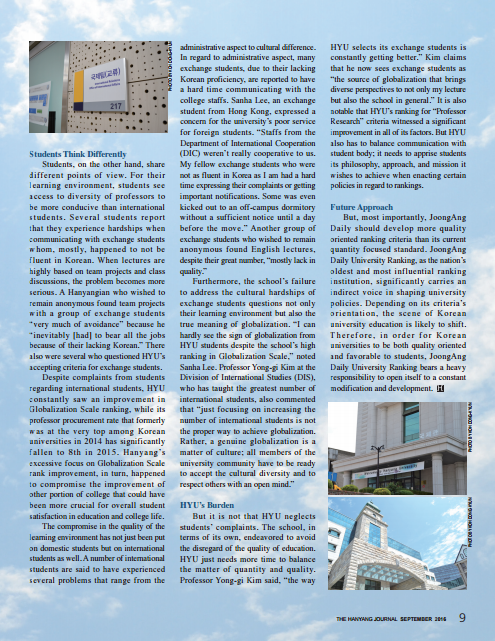Hanyang University(HYU) has shown a continuous rise in its university ranking. Formerly ranked 7th among Korean universities in 2014 JoongAng Daily University Ranking, HYU currently ranks 3rd only after a year, ahead of 4th Yonsei University and 5th Korea University. Appreciating it is, but such an abrupt progress needs to be cautiously reviewed. The school’s excessive focus on ranking might harm students’ welfare --especially if ranking criteria has a different focus from what students really wish from university. Students are in need of a good learning environment where they can be provided with not just the ample opportunities to pursue academics but, most importantly, high quality education. Is HYU aware of its students’ needs? It is also a wonder whether JoongAng Daily empathizes with students.
The Institutional Standard for a Good Learning Environment
A 4-year renewable full merit Diamond Scholarship Program, the largest database of free online lectures and entrepreneurship courses in nation --it is no doubt that HYU, as JoongAng Daily acclaimed in this year’s ranking, offers a great amount of educational services for students. But at the heart of this issue, there lies a question of ‘quality over quantity.’ In the array of services and resources the university provides, are students truly satisfied with the quality of those educational opportunities? Is the learning environment established by the school really doing a good job in facilitating the academic pursuit of students? JoonAng Daily thinks HYU does. According to JoonAng Daily, HYU has mostly fulfilled the factors that it perceives to form suitable learning environment for students.
One of the noteworthy factors to look at is the “Globalization Scale.” Globalization Scale assesses following aspects: the international student ratio; number of exchange students; diversity rate of foreign students; and the percentage of foreign professors among the faculty. The Globalization Scale is assessed in order to rank the college’s “Learning Environment,” a criteria that carries more than 37% of a whole four hundred points, making itself the most determining criteria in ranking. Among that 37%, the Globalization Scale factor makes up 40% of worth. This shows that JoongAng perceives that the Globalization Scale plays the significant role in forming a suitable learning environment for students. Improvement in the Globalization Scale, therefore, is significant enough to make an improvement in overall ranking. HYU’s overall rankings of the Globalization Scale have indeed significantly improved; the percentage of foreign professors was at 32nd and rose to 23rd, while the number of exchange students went from 7th to 3rd, and international student ratio, from 7th to 4th.
HYU also concurs that Globalization Scale can meaningfully measure the quality of the learning environment. Professor Lee, KiJeong, the Head of the Department of International Cooperation (DIC) in HYU who manages international student recruitment, stressed that academically excellent international student can “bring HYU a great learning environment, enhance the school’s prestige, and produce proHanyang personnel abroad.”
Students Think Differently
Students, on the other hand, share different points of view. For their learning environment, students see access to diversity of professors to be more conducive than international students. Several students report that they experience hardships when communicating with exchange students whom, mostly, happened to not be fluent in Korean. When lectures are highly based on team projects and class discussions, the problem becomes more serious. A Hanyangian who wished to remain anonymous found team projects with a group of exchange students “very much of avoidance” because he “inevitably [had] to bear all the jobs because of their lacking Korean.” There also were several who questioned HYU’s accepting criteria for exchange students.
Despite complaints from students regarding international students, HYU constantly saw an improvement in Globalization Scale ranking, while its professor procurement rate that formerly was at the very top among Korean universities in 2014 has significantly fallen to 8th in 2015. Hanyang’s excessive focus on Globalization Scale rank improvement, in turn, happened to compromise the improvement of other portion of college that could have been more crucial for overall student satisfaction in education and college life.
The compromise in the quality of the learning environment has not just been put on domestic students but on international students as well. A number of international students are said to have experienced several problems that range from the administrative aspect to cultural difference. In regard to administrative aspect, many exchange students, due to their lacking Korean proficiency, are reported to have a hard time communicating with the college staffs. Sanha Lee, an exchange student from Hong Kong, expressed a concern for the university’s poor service for foreign students. “Staffs from the Department of International Cooperation (DIC) weren’t really cooperative to us. My fellow exchange students who were not as fluent in Korea as I am had a hard time expressing their complaints or getting important notifications. Some was even kicked out to an off-campus dormitory without a sufficient notice until a day before the move.” Another group of exchange students who wished to remain anonymous found English lectures, despite their great number, “mostly lack in quality.”
Furthermore, the school’s failure to address the cultural hardships of exchange students questions not only their learning environment but also the true meaning of globalization. “I can hardly see the sign of globalization from HYU students despite the school’s high ranking in Globalization Scale,” noted Sanha Lee. Professor Yong-gi Kim at the Division of International Studies (DIS), who has taught the greatest number of international students, also commented that “just focusing on increasing the number of international students is not the proper way to achieve globalization. Rather, a genuine globalization is a matter of culture; all members of the university community have to be ready to accept the cultural diversity and to respect others with an open mind.”
HYU’s Burden
But it is not that HYU neglects students’ complaints. The school, in terms of its own, endeavored to avoid the disregard of the quality of education. HYU just needs more time to balance the matter of quantity and quality. Professor Yong-gi Kim said, “the way HYU selects its exchange students is constantly getting better.” Kim claims that he now sees exchange students as “the source of globalization that brings diverse perspectives to not only my lecture but also the school in general.” It is also notable that HYU’s ranking for “Professor Research” criteria witnessed a significant improvement in all of its factors. But HYU also has to balance communication with student body; it needs to apprise students its philosophy, approach, and mission it wishes to achieve when enacting certain policies in regard to rankings.
Future Approach
But, most importantly, JoongAng Daily should develop more quality oriented ranking criteria than its current quantity focused standard. JoongAng Daily University Ranking, as the nation’s oldest and most influential ranking institution, significantly carries an indirect voice in shaping university policies. Depending on its criteria’s orientation, the scene of Korean university education is likely to shift. T h e r e f o r e , i n o r d e r f o r K o r e a n universities to be both quality oriented and favorable to students, JoongAng Daily University Ranking bears a heavy responsibility to open itself to a constant modification and development.



